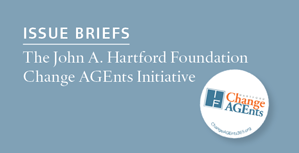 This is the last in a series of seven issue briefs.
This is the last in a series of seven issue briefs.The John A. Hartford Foundation Change AGEnts Initiative accelerates sustained practice change that improves the care of older adults. It does this by harnessing the collective power of The John A. Hartford Foundation’s interprofessional community of scholars, clinicians, and health system leaders.
In December 2015, nearly 100 John A. Hartford Foundation Change AGEnts gathered in Philadelphia, PA to identify challenges and opportunities for improving care of older adults in several care settings and issue areas. Each group worked toward identifying actionable areas for John A. Hartford Foundation Change AGEnts, the Foundation, and colleagues in the field to pursue. The brief below represents the summary of the Home and Community-Based Care group’s proceedings and should inform future work to create widespread and systemic changes in the care of older adults.
Home and Community-Based Care
Efforts continue to enhance the availability and affordability of long-term care services and supports provided in the home or community. Home care, home health, reduced fare or free transportation, caregiver support, evidence-based health promotion programs, and similar offerings are all critical to helping frail older people—particularly those with multiple chronic conditions—avoid skilled nursing, assisted living, or other (often more expensive) institutional care.
The Home and Community-Based Services (HCBS)/Family Caregiving Issue Group at The John A. Hartford Foundation Change AGEnts Conference was as diverse as the field itself, representing a full range of programs and settings. These different perspectives generated a wide array of ideas, as well as common challenges and opportunities.
 Challenges
Challenges
Despite a growing interest in HCBS, there are a variety of barriers that prevent innovators and advocates from implementing needed practice and policy changes.
- Finding a way to scale. There are a plethora of strong, evidence-based, community-based responses to providing better long-term or post-acute care. Most, however, are found in a limited number of places or lack resources to expand broadly. Each community, it seems, has its own, often idiosyncratic constellation of offerings. Because of this variability, many older adults and families struggle to understand what is available locally and what is right for them.
- Introducing evidence-based interventions. Given the patchwork quilt of smaller, under-resourced community-based organizations providing HCBS services, delivering tested, credible programs with sufficient assessment and evaluation remains a significant challenge.
- A rapidly changing policy environment. Given the federal, state, and local laws, regulations, and payment systems connected to home and community-based services, advocates struggle both to stay up-to-date and engage policy conversations effectively. The Center for Medicare Advocacy may serve as a helpful resource in this regard.

Opportunities
There was recognition that the growth of various alternative payment models (e.g., accountable care organizations (ACOs), value-based purchasing, Medicare-Medicaid duals demonstrations, bundled payments, etc.) is breaking down traditional divisions between health systems and community services providers.
These trends are driving health systems to pay more attention to post-acute care and community-based services that may drive down total cost of care for their patients. HCBS providers represent an important set of resources for these systems, but are not currently organized sufficiently to partner effectively or even to go directly to consumers.
- Aggregate for scale. Issue group participants talked about collectively identifying and connecting innovative services into larger, integrated packages that can serve larger numbers of people and serve as useful resources for health systems and public/private payers. There was a sense of urgency as there are significant opportunities, but the environment is changing. There is a need not only to “go big,” but to move fast. As one participant put it, “The conversation is going at warp speed. And instead of solutions to reach 750 people, health systems want programs to reach 75,000 people.”
- Yelp for (LTC) Help? Consumer-driven technology platforms such as Uber, TripAdvisor, Angie’s List, and the like could be engaged to connect service providers and older adults and their families. While most Change AGEnts’ innovations focus on services covered by public/private insurance, there are significant opportunities for products/services that older adults and their families might pay for themselves. Developing platforms like MySupport and others represent examples of these kinds of approaches.
- Recognize the importance of national organizations with local reach. National, community-based organizations such as the YMCA (represented in the Issue Group) can develop needed services while also serving as a delivery system for a range of home and community-based interventions.
- Start with the most vulnerable. Creating services/delivery systems that serve the hardest-to-reach will provide broadly relevant learnings and insights and the best system for everyone. For example, the service or system designed for the schizophrenic homeless older adult would be easy to use for a broader population.
- Take advantage of Community Health Needs Assessments (CHNAs). Through a provision in the Affordable Care Act, charitable/nonprofit hospitals must complete a CHNA every three years. Helping these providers complete these assessments (or build off them) can position HCBS providers to partner with hospitals to meet a community’s long-term care needs.
- Build business acumen. In a project developed by the Administration for Community Living and supported by The John A. Hartford Foundation, 11 communities are receiving training and support to develop their capacity to advocate for and “sell” the value of HCBS to health systems and other providers. Disseminating learnings from this effort and expanding its learning collaborative suggests a hopeful opportunity to build the field.
- Raise and amplify the expertise and value of ourselves and our clients. Providers and innovators for older adults hold the key intellectual and experiential capital for multiple strategic avenues to reduce overall costs. This makes our community the experts that many health organizations currently need. Service design and innovation must employ this unique (and desperately needed) perspective, and not only create interventions that meet older people’s needs, but aim higher and try to delight and inspire.
Thoughtful and Practical Answers to the Big Questions
The world of home and community-based services is a VUCA (Volatile, Uncertain, Complex, Ambiguous) world unto itself. Advocates and John A. Hartford Foundation Change AGEnts face significant hurdles in improving the care of older people, but this rapidly changing environment offers much hope.
The aging expertise and innovations supported by The John A. Hartford Foundation and its grantees represent thoughtful and practical “answers” to the big questions health systems and others are now confronting as they seek to transform long-term care and generate Triple Aim benefits. Further investments in these passionate people and their programs should yield significant progress.
Home and Community-Based Services Issue Group Participants
Sarah Szanton, PhD, RN, ANP
Johns Hopkins University
John Beilenson, MA (Facilitator)
SCP
Sokha Koeuth, MPH, BBA (Notetaker)
Center for Innovative Care in Aging
Johns Hopkins University
Tina Abbate Marzolf, MA
Area Agency on Aging 1-B
Mary Altpeter, PhD, MSW, MPA
UNC at Chapel Hill
Juliana Cartwright, PhD, RN
Oregon Health & Science University
School of Nursing
Kate Clark, MPA
Philadelphia Corporation for Aging
Jill Eden, MBA, MPH
Institute of Medicine/National Academies
of Science, Engineering, and Medicine
Chris Forcucci, RN (Senior Respondent)
Aging & In-Home Services of
Northeast Indiana, Inc.
Heather Hodge, MEd
YMCA of the USA
Scott Kaiser, MD
MPTF (Motion Picture & Television Fund)
Mark Kunik, MD, MPH
Houston VA Medical Center,
Baylor College of Medicine
Bruce Leff, MD
Johns Hopkins University
Ina Li, MD
Christiana Care Health System
Renée Markus Hodin, JD
Community Catalyst
Jennifer Raymond, JD, MBA
Healthy Living Center of Excellence
Elder Services of the Merrimack Valley
Sandra Spoelstra, PhD, RN
Grand Valley State University
Judith Stein, JD
Center for Medicare Advocacy
Nancy Whitelaw, PhD
Practice Change Leaders
Joan Zlotnik, PhD, ACSW
National Association of Social Workers
Read the previous posts in The John A. Hartford Foundation Change AGEnts Issue Briefs series:
